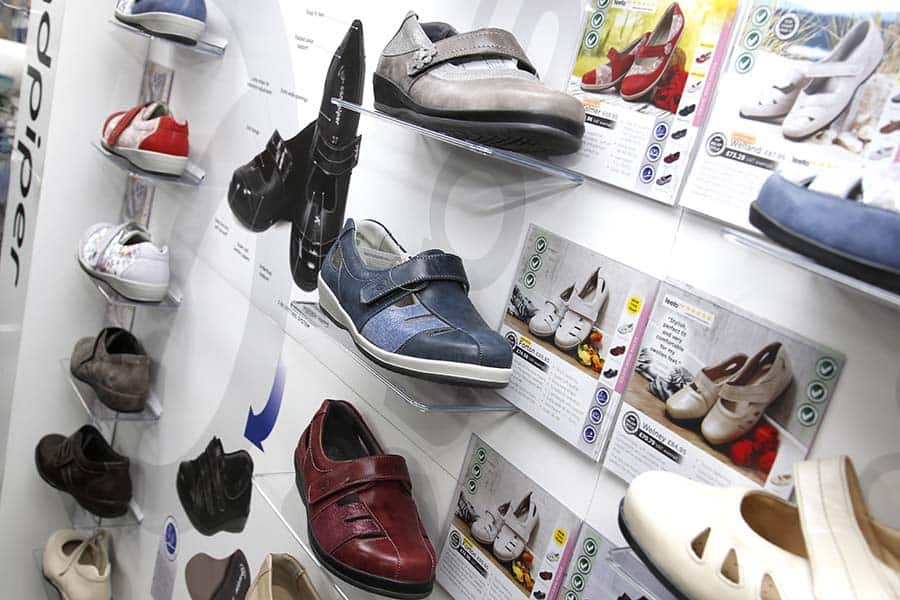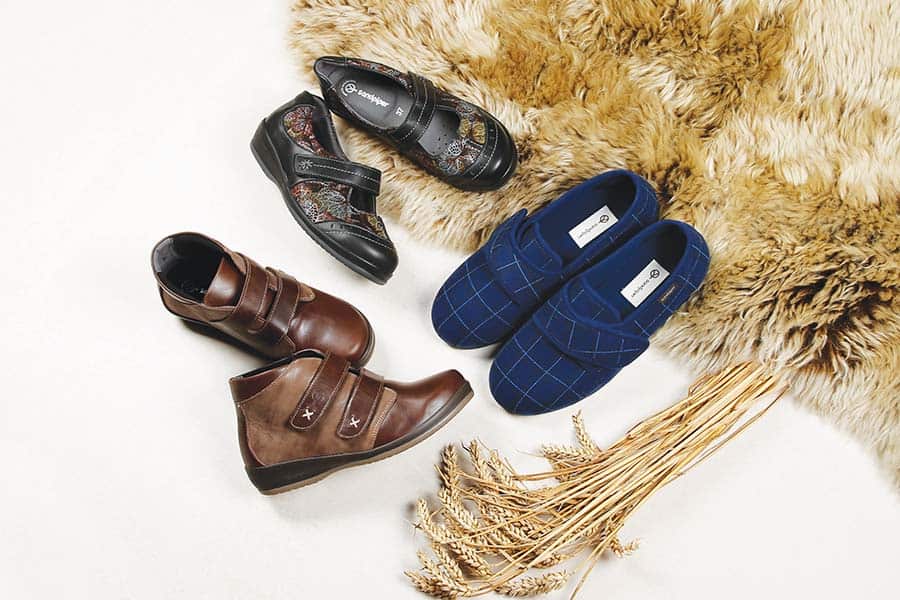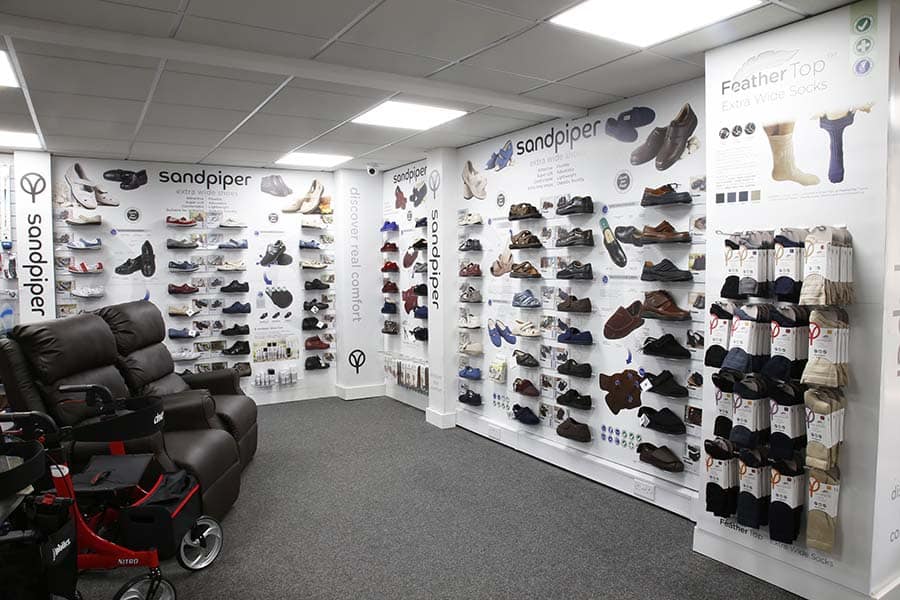Supplier Spotlight: Stepping into specialist footwear with Sandpiper Shoes

As we move into colder days and longer nights, the mobility sector is also heading into its quieter period as sales start to cool off on big-ticket items such as powered mobility aids.
With an uncertain winter ahead adding to the usual seasonal pressures, retailers will be on the hunt for new revenue streams. While not quite able to fill the shoes of mobility scooters, one potential segment that could drive footfall is footwear.
Sandpiper Shoes’ Phil and Carol Stanton discuss why and how retailers can step up their sales in this specialist segment.
Well known as one of the leading players in the specialist shoe sector, Sandpiper Shoes has been providing a wide range of premium, extra wide shoes, boots and slippers designed for end-users in search of enhanced support and comfort.
Last April, the footwear brand was acquired by mobility retailer Oakley Healthcare. Since then, Sandpiper Shoes has been on a transformation.
Carol Stanton, Distribution Director of Sandpiper Shoes, reflects on the year and a half journey the brand has been on since the acquisition by the Northamptonshire-based mobility company.
“In this time, Sandpiper has been reviewed in every aspect in order to make improvements that will ensure the fitness of the company for the foreseeable future,” she says.
“Challenges in terms of supply chain and stock levels have been addressed over 2019, with future plans for the firm revolving around expansion.”
Like most players in the mobility sector, however, its big plans for this year have had a spanner thrown into the works due to the pandemic.
“2020 was to be the year where increased marketing to help improve brand awareness was going to take place, with an increase in retailers in parts of the country not currently well served,” continues Carol.
“Obviously COVID-19 is still having a knock-on effect on the industry at large, but these plans should still go into effect over the next 12 months.”
As part of its growth plans, the company recently unveiled a new autumn/winter range just ahead of the festive season, alongside introducing its new affiliate initiative. The scheme, according to Sandpiper, will provide a new and easy way for retailers to work with the brand.

Dipping a toe into footwear
Carol explains that the affiliate initiative was set-up as an entry-level route for companies in the mobility sector to engage with Sandpiper, as well as with the footwear segment more generally.
“Our new Sandpiper affiliate programme is mainly designed for mobility customers, new to selling footwear, who wish to try footwear sales without a large initial commitment,” she says.
“It is a commission-based system, where details of customers wishing to purchase footwear are passed directly to us at Sandpiper by the affiliate store and we follow up, process and fulfil the order directly.”
In return for passing on the successful lead, the affiliate store receives a commission payment for the sale. Importantly, the retailer also receives a commission payment for any subsequent purchases made by that customer directly to Sandpiper.
“There is the opportunity for mobility retailers to become ‘the local shoe shop’ for these consumers in their particular town.” Phil Stanton
The scheme offers mobility dealers a low-risk, low-commitment means of introducing a new product range to their existing clients without making the investment of purchasing and holding stock. Carol notes the decision to launch the programme was partly driven by the impact of the coronavirus, potentially preventing retailers from being open to diversifying into new areas in such uncertain times.
“Obviously, this method is not as profitable for the affiliate store as stocking footwear and selling the footwear instore using our standard wholesale business model. It is perfect for businesses just starting out with footwear, though,” she points out.
“Part of the reasoning behind the new scheme was also to help mobility businesses who may be struggling with cash flow during the current COVID-19 crisis, helping to reduce the initial financial outlay required to secure a sale.”

Why set foot into the footwear sector?
Retailers specialising in traditional mobility products, particularly around bigger ticket items such as powered mobility vehicles and mobility furniture, may question whether shoes are a worthwhile investment.
Emphasising the importance of the product category for mobility shops, Phil Stanton, Sales Director of Sandpiper Shoes, highlights the unique benefits shoes have for driving footfall to physical mobility shops, particularly as dedicated shoe stores continue to vanish from the high street.
“It is clear that profit made on a single pair of shoes is not comparable to that of a mobility scooter or recliner chair. They are, however, a high-quality product that can be made available for online sales or as the perfect gift idea for additional seasonal sales,” he contends.
“Remember, high street footwear retailers are becoming more and more scarce due to the competition from online. Many younger shoppers may be happy to go online but many of the consumers looking for extra wide footwear tend to be from the older generation.
“They don’t have online as an option for purchases and need to visit a shop, try the footwear on and buy from a real person in a store. There is the opportunity for mobility retailers to become ‘the local shoe shop’ for these consumers in their particular town.”
Alongside driving initial footfall, Phil also asserts that shoes lend themselves to repeat custom, keeping shoppers coming through the door all year round and avoiding seasonal lulls.
“Part of the reasoning behind the new scheme was also to help mobility businesses who may be struggling with cashflow during the current COVID-19 crisis…” Carol Stanton
“These consumers will happily come back again and again to a store they know and trust, to purchase shoes, boots, slippers or sandals as the seasons change and as their particular footwear requirements change,” he maintains.
“Sometimes, mobility stores think that selling footwear is hard work for small profits. But, that process of finding the correct footwear, discussing the various options with the customer and satisfying their requirements is the perfect way to demonstrate the customer service offered in your store and really help build customer relationships.
“This will nearly always pay off further down the line. Where is that customer going to go first when they need one of the more expensive items they have seen in your store?”
Treading carefully into footwear
Despite the convincing benefits of adding footwear to a store’s product portfolio, the company acknowledges that retailing footwear does come with its own set of challenges that retailers should be aware of.
Arguably, the key difficulty for those looking to do more in the specialist shoe segment is deciding just what to sell. With a wide variety of SKUs, knowing which products to display and stock in a small retail space can be a challenge for mobility companies unfamiliar with the category.
“Compared to some products stocked by a mobility store, the range of styles, colours, sizes and fitting options offered in a footwear range can initially seem overwhelming,” accepts Distribution Director Carol Stanton.
“However, as part of the service offered to retailers, Sandpiper is able to guide new customers through the process of choosing the bestselling styles to stock and explaining the fittings systems. This is also all supported by informative marketing material which can help stockists learn about the products.”
Making shoes stand out and look attractive in a showroom is another consideration for those looking to make sales and avoid shoes collecting dust. Fortunately, the experience of operating Oakley Healthcare has given the Sandpiper team the ability to understand the requirements of its trade customers.
“The merchandising and trade team are able to help with setting up a striking footwear display in-store and offer assistance with product data for help setting up POS systems,” continues Carol.
“In any case, our trade team are always only a phone call away on 01295 277377.”

Making footwear a runaway success
In addition to helping to bring stylish merchandising and marketing to retailers to help move units, Sales Director and experienced mobility retailer Phil also shares some of his top tips for making the most out of selling extra wide footwear.
“To make the most of selling footwear in-store, mobility retailers need to think slightly differently about shoes and slippers than they would a scooter or recliner chair,” he advises.
“It is easy for a customer to accept that they will need to wait for these high-ticket items to be ordered and delivered, anything between a few days or even a few months. Footwear is different. Even if a customer goes out with the intention of buying a new pair of slippers, ultimately, it is an impulse purchase and if the style or colour they need is not in stock to try on and take away, a large percentage of sales will be lost.”
Phil warns that any barriers put in the way of preventing the customer from carrying out an impulse buy will significantly increase the risk of the client having second thoughts. However, he states Sandpiper can offer a variety of options to ensure sales are maximised.
“Services offered by Sandpiper such as drop-shipping footwear directly to a customers’ homes on behalf of retailers can help secure a proportion of these possible lost sales but some, unfortunately, will always be lost.”
His advice to stop these valuable footwear sales from walking out the door is simple: keep a focused range, stocked in a good variety of sizes.
“For new customers, stocking a limited range of styles and having them available in all sizes will lead to more sales conversions than holding a large range of style options that are not supported with alternative sizes,” suggests Phil.
“From discussions with a mobility retailer who has invested in a larger stock holding in the last 18 months, they have shown an increase in month-to-month sales of between 20-50 per cent simply from not losing walk-in sales.
“Many of these customers end up purchasing more than a single pair of shoes and get slippers as well because the stock is there to take away.”
In step with retailers
Understanding the difficulty for retailers to jump on board with a new product line and new supplier during this time, Sandpiper’s Carol reaffirms the company’s commitment to its trade partners.
“With much of the business model for Sandpiper revolving around selling wholesale to mobility stores nationwide, the business has seen a great deal of change caused by the COVID-19 pandemic,” she finishes.
“The wholesale side of the business is one in which the brand sees as essential and is keen to invest in. The nature of the product and the older demographics of the customers means many will always prefer to visit an outlet to try their footwear on before purchasing. As such, the Sandpiper team are always considering initiatives to help their retail stockists thrive.
“This can be through offering innovative terms or new and exciting ways to help them provide online sales to help future-proof their businesses.”
With the uncertainty of a coronavirus-dominated winter ahead, Sandpiper’s affiliate programme may just give retailers the option needed to take the first step into footwear, be it online or within a bricks and mortar setting, without being overly exposed in the current climate.
https://thiis.co.uk/supplier-spotlight-stepping-into-specialist-footwear-with-sandpiper-shoes/https://thiis.co.uk/wp-content/uploads/2020/12/Sandpiper-Shoes-retail-display.jpghttps://thiis.co.uk/wp-content/uploads/2020/12/Sandpiper-Shoes-retail-display-150x150.jpgNewsroomRetailer NewsSupplier NewsSupplier SpotlightTrade FocusTrade Newsaffiliate programme,Carol Stanton,coronavirus,COVID-19,extra wide shoes,gifts,mobility retailers,Oakley Healthcare,Phil Stanton,Sandpiper Shoes,specialist shoes,winterAs we move into colder days and longer nights, the mobility sector is also heading into its quieter period as sales start to cool off on big-ticket items such as powered mobility aids. With an uncertain winter ahead adding to the usual seasonal pressures, retailers will be on the hunt...Calvin BarnettCalvin Barnettcalvin.barnett@bhta.comAuthorTHIIS Magazine

